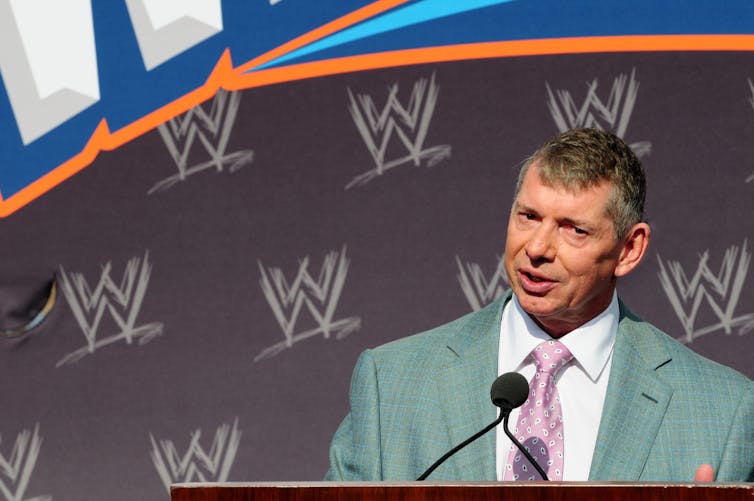World Wrestling Entertainment’s (WWE) “WrestleMania” is the biggest event in the professional wrestling calendar. Marketed for 2023 as the event where “WrestleMania Goes Hollywood”, the two nights of glitz, glamour and grunting pugilists turned out to be somewhat prophetic.
On April 2, the second day of WrestleMania 39, CNBC broke the news that WWE is to be sold to Hollywood talent agency, Endeavor Group Holdings Inc.
Endeavour, which also owns the Ultimate Fighting Championship (UFC), is to merge the “two iconic, complementary, global sports and entertainment brands: UFC and WWE” to form a new “US$21-plus billion [£18.5 billion] live sports and entertainment company”.
Back in January 2023, when majority shareholder of WWE Vince McMahon announced that he was to pursue a sale of the company, there was no shortage of speculated suitors.
Up first was Saudi Arabia’s Public Investment Fund (PIF). The rumour (which turned out to have no substance) caused a stir in the professional wrestling fandom.
Fears ranged from concerns about the consequences for female performers to the potential damage that could be done to the legacy of the sport.
Following the debunking of the PIF sale, an extensive slate of potential buyers emerged, including Fox, Disney, Netflix, Amazon, Liberty Media and Endeavor.
It was its ownership of the UFC that gave Endeavor the edge. While Liberty Media holds interests in global sports – namely Formula One and baseball team the Atlanta Braves – there was already a substantial crossover of audience and talent between WWE and UFC prior to the merger.
With WWE superstars such as Brock Lesner competing in the UFC and UFC fighters such as Ronda Rousey having successful runs as WWE performers, the formalisation of synergies between the two companies seemed too tempting to resist.
As McMahon put it: “All the WrestleManias combined … doesn’t really equal to the magnitude of what we will do together.”
Who will be running the show?
Vince McMahon retired from his position of WWE chairman in July 2022, after the Wall Street Journal revealed that he had paid US$12 million in hush money to four women.
The payments secured nondisclosure agreements to prevent public revelations of alleged sexual misconduct and infidelity. McMahon denied the allegations, saying through his lawyer Jerry McDevitt that he settled solely to avoid the cost of litigation.
Six months later, McMahon returned to WWE, reshaping the board of directors and allegedly threatening to block any media rights deal or sale unless he had direct involvement as executive chairman.

WENN Rights Ltd/Alamy Stock Photo
Now, as part of the WWE-UFC merger, McMahon will become executive chairman of the new company. The current CEO of WWE, Nick Khan, will become its president and Dana White will remain president of UFC.
This, coupled with White’s recent domestic violence scandal (he was filmed assaulting his wife in the lead up to the launch of the controversial UFC spin-off, Power Slap League) provides Endeavor’s new venture with a rather infamous executive from the outset. White later apologised for the inicident.
Power Slap League: a brutal ‘sport’ that may leave contestants with brain damage
What’s next for WWE talent?
As a researcher of professional wrestling, I believe that the merger offers both positives and negatives for WWE talent.
As an influential talent agency, Endeavour could offer wider media exposure for WWE talent. This would follow in the footsteps of Hollywood crossover stars such as Dwayne “The Rock” Johnson, Dave Batista and John Cena.
However, with high-profile UFC fighters such as Connor McGregor already teasing a move into professional wrestling, existing WWE talent may now get less exposure, as WWE looks to capitalise on UFC star power.
In the world of professional wrestling, where the storylines are often as fanciful as they are spectacular, something as mundane as a corporate merger has the potential to become just as dramatic as the action in the ring.




